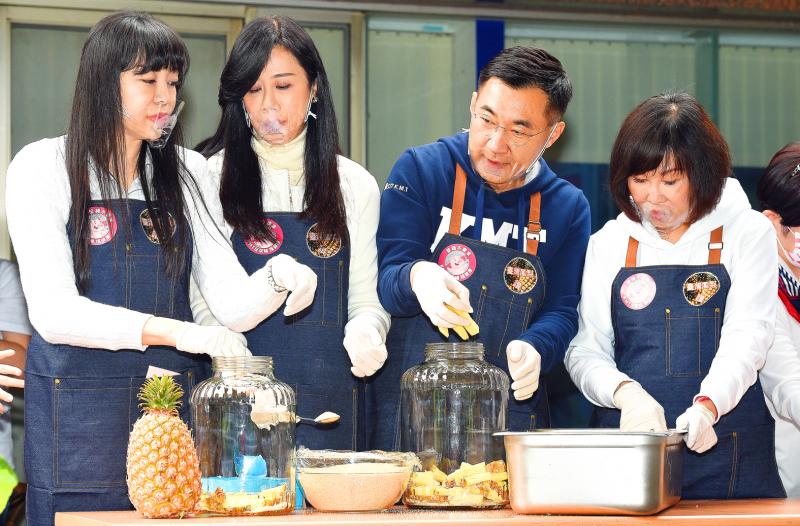The Chinese Nationalist Party (KMT) today plans to submit to the Central Election Commission (CEC) signatures it has collected backing its petitions to hold referendums on imported pork containing racotpamine residue and when referendums should take place, the party said yesterday.
The KMT last year proposed a public referendum, spearheaded by KMT Legislator Lin Wei-chou (林為洲), that would ask voters if they agree that the government should completely ban imports of meat, offal and related products from pigs fed with ractopamine.
It followed the Democratic Progressive Party’s announcement in August last year that it would ease restrictions on the importation of US pork containing traces of the animal feed additive and beef from cattle aged 30 months or older from Jan. 1.

Photo: Liao Chen-huei, Taipei Times
The other proposed question, initiated by KMT Chairman Johnny Chiang (江啟臣), would ask voters if they agree that referendums should be held on the same day as nationwide elections if an election is scheduled to take place within six months of a proposal to hold a referendum being approved.
The Referendum Act (公民投票法) stipulates that referendums from this year are to be held once every two years on the fourth Saturday of August.
The two petitions have each garnered more than 700,000 signatures, Chiang announced in Taipei at an event organized by the KMT Women’s Department to mark International Women’s Day.
“I believe one thing all women are actually very concerned about is food safety,” he said.
The KMT would help to ensure food safety, he said, before leading a group of KMT members in reading a pledge to “support Taiwanese pork, Taiwanese cabbage [and] Taiwanese pineapples.”
Domestic pineapples since Monday last week have been subject to a Chinese import ban.
In the face of successive issues related to domestic food safety and agricultural products, the government has been “unable to propose solutions that reassure [Taiwanese] and farmers,” the KMT said in a statement.
The KMT would “pursue the realization of the public expectation of a toxin-free home,” it said, adding that the next step in its referendum campaign would be to call on voters to cast their ballots on Aug. 28 — the next possible date for a referendum to be held.
“It will be the last mile to protecting food safety in Taiwan,” the party said.
Chiang and Lin would take the signatures from the KMT’s headquarters in Taipei and deliver them to the commission’s offices by car this morning, the KMT said.
If the proposed questions are put to voters, at least one-quarter of eligible voters must vote in favor of the proposals, with the number of “yes” votes exceeding the number of “no” votes, for them to pass.

A decision to describe a Chinese Ministry of Foreign Affairs statement on Singapore’s Taiwan policy as “erroneous” was made because the city-state has its own “one China policy” and has not followed Beijing’s “one China principle,” Deputy Minister of Foreign Affairs Tien Chung-kwang (田中光) said yesterday. It has been a longstanding practice for the People’s Republic of China (PRC) to speak on other countries’ behalf concerning Taiwan, Tien said. The latest example was a statement issued by the PRC after a meeting between Singaporean Prime Minister Lawrence Wong (黃循財) and Chinese President Xi Jinping (習近平) on the sidelines of the APEC summit

Taiwan’s passport ranked 34th in the world, with access to 141 visa-free destinations, according to the latest update to the Henley Passport Index released today. The index put together by Henley & Partners ranks 199 passports globally based on the number of destinations holders can access without a visa out of 227, and is updated monthly. The 141 visa-free destinations for Taiwanese passport holders are a slight decrease from last year, when holders had access to 145 destinations. Botswana and Columbia are among the countries that have recently ended visa-free status for Taiwanese after “bowing to pressure from the Chinese government,” the Ministry

HEALTHCARE: Following a 2022 Constitutional Court ruling, Taiwanese traveling overseas for six months would no longer be able to suspend their insurance Measures allowing people to suspend National Health Insurance (NHI) services if they plan to leave the country for six months would be abolished starting Dec. 23, NHIA Director-General Shih Chung-liang (石崇良) said yesterday. The decision followed the Constitutional Court’s ruling in 2022 that the regulation was unconstitutional and that it would invalidate the regulation automatically unless the NHIA amended it to conform with the Constitution. The agency would amend the regulations to remove the articles and sections that allow the suspension of NHI services, and also introduce provisional clauses for those who suspended their NHI services before Dec. 23, Shih said. According to

Minister of Labor Ho Pei-shan (何佩珊) yesterday apologized after the suicide of a civil servant earlier this month and announced that a supervisor accused of workplace bullying would be demoted. On Nov. 4, a 39-year-old information analyst at the Workforce Development Agency’s (WDA) northern branch, which covers greater Taipei and Keelung, as well as Yilan, Lienchiang and Kinmen counties, was found dead in their office. WDA northern branch director Hsieh Yi-jung (謝宜容), who has been accused of involvement in workplace bullying, would be demoted to a nonsupervisory position, Ho told a news conference in Taipei. WDA Director-General Tsai Meng-liang (蔡孟良) said he would